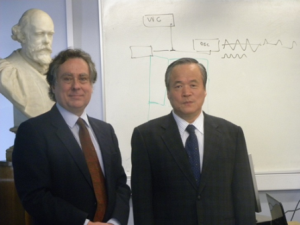Oct 15 2013
The Liverpool Particle Physics Group, based in the Department of Physics, played host to a senior delegation from Hamamatsu Photonics K.K. in Japan.
 Phil Allport, one of the world leaders on the HL-LHC, is pictured with Yamamoto San
Phil Allport, one of the world leaders on the HL-LHC, is pictured with Yamamoto San
The Senior Managing Director, Koei Yamamoto, was accompanied by colleagues from Europe and UK operations and visited the department to hear from academics outlining Liverpool research at the JPARC Laboratory in Japan and, in particular, activities at the University to address the challenges of upgrading experiments at CERN, the home of the Large Hadron Collider.
Employing more than 4,000 staff, Hamamatsu Photonics is a world leader in the development and manufacturing of scientific instrumentation in the areas of optical sensors, photodiodes, image sensors, opto-semiconductor elements and ionising particle detectors with a large commercial market for many of its products.
Radiation hardness is a key research area that the University and Hamamatsu collaborate on, and the head of the CERN RD50 Collaboration, Gianluigi Casse, presented the latest results on technologies to withstand the highest doses of radiation expected at the proposed High-Luminosity LHC.
The Liverpool University Particle Physics Group is one of the largest in the UK with a comprehensive programme of research into the fundamental particles and forces of nature conducted primarily at international research facilities on three continents.